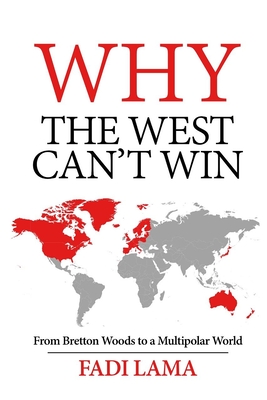
Geopolitical upheaval has gripped the world since collapse of the Soviet Union. During the 1990s the West focused on eliminating the resurgence of Russia as a great power. This led to the assimilation of Warsaw Pact countries into NATO, two Chechen wars, and political systems in the Central Asian republics aligned with the West.
Then the West’s focus turned to China as a potential challenger to western global hegemony. It was thought to suffice to control global energy resources and sea-lanes to China to prevent China from challenging western global hegemony. Hence the first two decades of the millennium were focused on controlling West Asia and North Africa‘s energy resources.
For most, the collapse of the Soviet Union in 1991 signaled the victory of the self-denominated Free World. Why the West Can’t Win, however, addresses how events in the three following decades signal the end of a millennium of West European expansionism, a plundering and oppression initially labeled Crusades when the popes embodied political power, morphing into colonialism, then to the Free World when colonialism went out of fashion post-World War II, and at last to the “International Community” after the collapse of the Soviet Union.
This book’s geopolitical analysis includes a historical overview, an understanding of the financial systems established at the Bretton Woods conference that continue dominating the global economy, how they are used as a powerful geopolitical instrument, an economic analysis based on real goods production, global energy dynamics, alliances and strategies of key global players.
It addresses the emerging division of the world into two geopolitical Western Europe, North America, Australia, New Zealand and Africa, Asia and Latin America.
The current global geopolitical clash is in essence a struggle between the colonial powers wishing to preserve the Bretton Woods system that allows siphoning wealth of nations, and sovereign nations striving for independence and an end to a millennium of oppression. This work compares the geopolitical forces since the turn of the millennium with a view to providing insight into their relative strengths and the likely outcome of this struggle. — Book promo @ goodreads.com
If an empire cannot project power, it is no longer an empire. Bases surrounding a country are transformed from threat-projecting assets to vulnerable liabilities. Aircraft carriers, the ‘long arm of the law,’ are transformed from floating islands for launching offensives into fat sitting ducks. It is not surprising therefore, that after the Ain al-Assad missile attack, CentCom relocated its headquarters from Doha, Qatar at 200 kilometers from Iranian shores to safety in Tampa Florida, over 12,000 kilometers away from Iran.

I went online shopping for more Earthborn with lamb and could not find any from the suppliers that I have used in the past. So have ordered some Canidae with lamb which I quit using because it was difficult to get. It was also cheaper. HA
While I was in the shopping mood I also got more Molina Vanilla Blend which I use with plain non-dairy yogurt or skyr yogurt (which is technically not a yogurt but is a cheese).
Skyr is a dairy product but the way it is made reduces most of the lactose which I have been trying to avoid. It is thicker that Greek yogurt and much thicker than almost all non-dairy yogurts; Kite Hill being an exception that is comparable to Greek yogurt.

I did not turn my clocks back; so I’ll now be living one hour in the future.
I greet you, people of the past. Your ways are quaint.
You might try the Pet Food Center here in Evansville, online. I think they ship nationwide and they always have what you are looking for in stock. Earthborn is made here in Evansville might be the reason for availability.
I have been buying Earthborn Grain Free Meadow Feast that was with lamb. The Pet Food Center is Sold Out and the best that I can determine that ‘flavor’ is no longer offered. I may buy from the Pet food Center in the future but it will probably have to be Coastal Catch or Great Plains Feast.